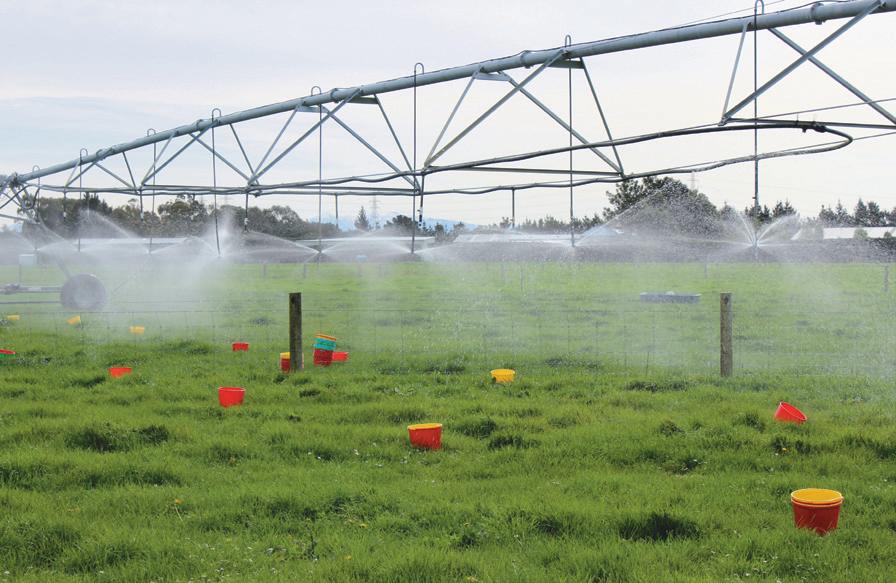
4 minute read
Brits foil bid to protect Manuka
by Ruralco
hives almost overnight, and how it leaves those bees that were not in the hive at the time stranded and without a home. “If the SPCA covered bees as they do other stock, they would not be happy with what they would find,” says Bryon. “If you look after the bees, they will look after us.” For the Bluett’s this also extends to the landowners who they rely upon for hive locations. Many kids growing up on farms will recall the tubs of honey ‘paid’ to their family by grateful beekeepers for allowing the hives to co-exist alongside livestock on farms. The Bluett’s work hard to keep this age-old tradition of respect and reciprocation alive in an environment where beekeepers have become more aggressive in how closely they place hives to other operators, and how frequently they will move those hives to other sites often chasing the golden lure of manuka returns. As for all beekeepers, the past few seasons have been tough for the Bluett’s with global honey prices very depressed, often down to only $2.50 a kg, when production break even value is nearer $7 a kg. But Bryon has some cause for optimism with recent non-manuka honey prices starting to lift and interest remains firm from overseas for Eltham’s high quality comb honey. Meantime there is also some adjustment occurring on the supply side of the honey equation. New Zealand has become effectively overstocked with bees in the past few years as beekeepers ramp up hive numbers to secure manuka honey. This is despite experts cautioning that overstocking, just as in a pastoral farm, can lead to unhealthy bee populations and overall poor productivity. The Bluett’s appreciate this more than most, with the last apiculture survey showing their area, the lower North Island, comprises 42% of the North Island’s total hive numbers. “But we are also seeing a bit of a shakeout in hive numbers, which have dropped by 100,000–150,000 in the past few months from a record high,” Bryon. Operationally the big disease challenge for the Bluett’s is varroa. Endemic in New Zealand since the early 2000s, it requires constant monitoring to keep mite numbers down from levels that can impinge on hive health. The increase in wasp populations over the years has also added stress onto hives. Bryon maintains minimising hive stress by less movement helps bees maintain more resilience in dealing with these health challenges. Fifty-five years ago, when Trevor started selling honey it was in an industry that had a good level of unity and collaboration, something Sonia laments is missing today, and is sorely needed back. “We have industry bodies, but they are quite separate, and as an industry we need a single body that speaks with a single voice for the industry, particularly on hive health and biosecurity—we are struggling as an industry to be taken seriously by government,” says Bryon. “I think the only way the government will really take the industry seriously is when we can speak to them with a single voice,” says Bryon. They are also concerned at the erosion of collaboration and camaraderie between beekeepers as hive numbers have grown, with far greater secrecy and lack of disclosure between even neighbouring beekeepers on where hives are located. As a company, the Bluett’s remain committed to doing what they have always done so well. That is producing high quality honey and honey products in a sustainable way that is sensitive not only to the land, but also their clients, and their community where they play a big role with school fundraising and promoting healthy bees in the environment. Bryon describes bees as the “canary in the coal mine” for all the environment, and the first indicators if something is wrong in the environment. “Bees lack the ability to break down toxins that build up within them, so their health is a good indicator of the environment we all live in. For us, this is not a 9 to 5 job, it’s a passion, a way of life that requires us to ensure our bees can live as healthily as possible.”
Like many in the industry, the Bluett’s were dismayed to learn late last year New Zealand ’s efforts to protect the term “Manuka” had been rejected by the United Kingdom Trade Commission.
Advertisement
The industry, with government backing, had been seeking to ensure the term would be protected for exclusive use by New Zealand honey makers alone, this would make the term protected in the way “Champagne” is for French bubbly and “Parma” is for ham from Italy. Apiculture New Zealand CEO Karin Kos says she was dismayed at the commission’s ruling, which supported Australian honey producers’ claim to also use the title. She said this was even more so, given the positive prospects the United Kingdom market held for further manuka honey sales. At present the United Kingdom and China are the two biggest export markets for manuka honey. “There is no argument the Australians were producing a manuka honey, but they used to call it something else, often bush honey. New Zealand has done a lot of marketing and standards work for its manuka honey and has gained good traction. Other countries are now seeing this as a good thing to jump onto,” says Bryon. He likens the rights to having exclusive use on “Manuka” to that of French Champagne makers who sought successfully to pull back use of the term “Champagne”, well after other countries had started using it. “Just because someone else somewhere else has chosen to use the term does not mean they should be allowed to continue to use it.” Representatives of manuka honey manufacturers are hoping to appeal the commission’s decision this year.













